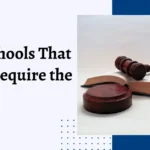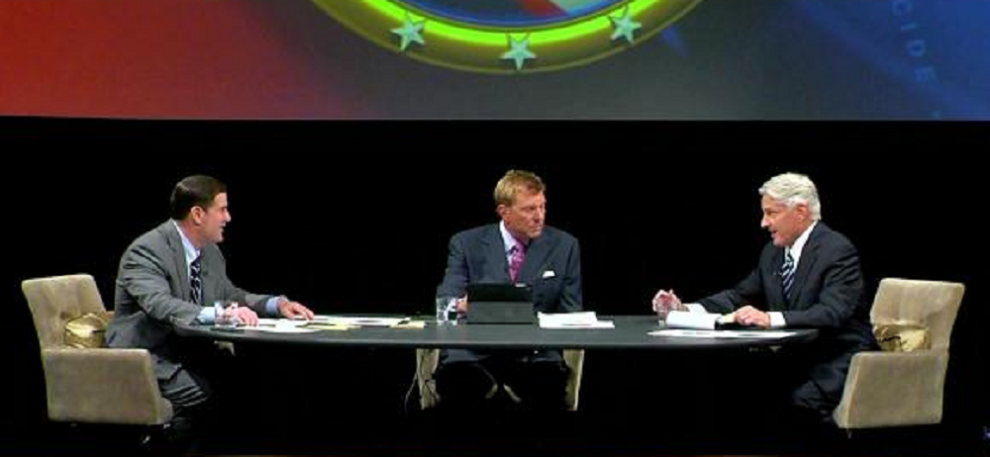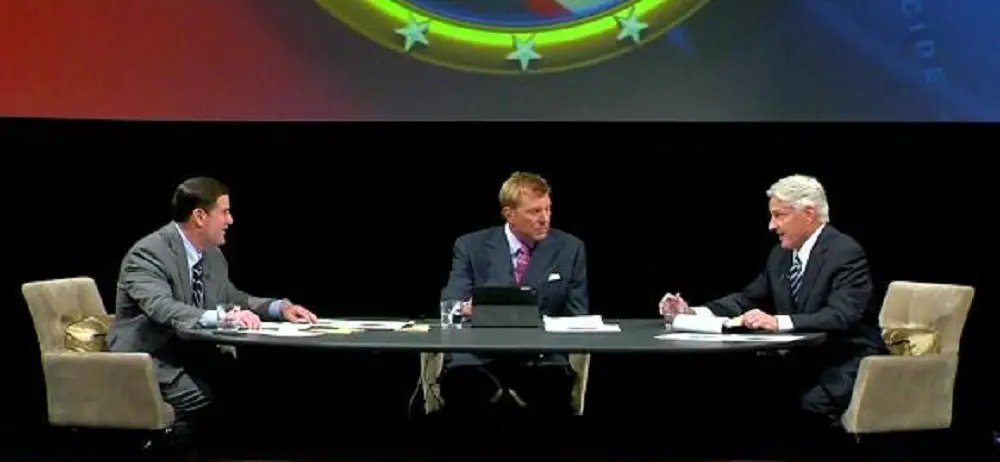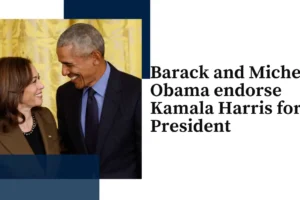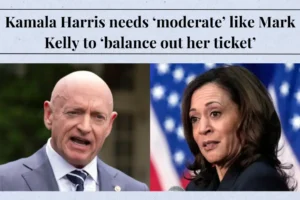Arizona candidates for governor Doug Ducey and Fred DuVal had conflicting views on Common Core standards and the inflation funding court decision during a debate in Phoenix focused on K-12 education issues.
The debate was hosted by six Arizona education groups, attended by many of their members, moderated by Fox 10 News‘ John Hook and aired live Sunday evening.
Arizona candidates for governor Doug Ducey and Fred DuVal discuss education issues at a debate Sunday hosted by six education groups and moderated by Fox 10 News’ John Hook. Photo courtesy Fox 10 News
Democratic candidate DuVal said he supports the standards, while Republican candidate Ducey opposes them.
“The standards have come about because there’s an understanding that our children – our high school graduates – will all be competing in a global economy against talent not just across the city or state, but talent across the world,” DuVal said. “Local school districts or states have all the power to decide what teaching methods and how we meet those standards.”
DuVal noted the business community has supported the standards because it will help them develop skilled employees.
“I’ve spoken out against Common Core,” Ducey said. “I oppose it because it ties us to Washington D.C., for funding and purchases obedience from the states for certain waivers that are needed for K-12 education.”
Instead, Ducey said he would like Arizona statewide standards developed by business and education leaders.
School funding
Before the debate began, Scottsdale Unified teacher Mark Severino said he wanted to hear how the candidates would provide more financial support for districts.
“I think spending is important. I think budgets are important. But what I think is more important are outcomes and results,” Ducey said.
Karen Callahan, executive director of Genesis Academy, which is an alternative charter high school in Phoenix, said she was interested in the candidates’ education priorities and views on school funding.
“We are not properly funding our children’s schools, and our children are being left behind,” DuVal. “I will stop the cuts to our public schools. I will use the veto if I have to, but I will not allow another dollar – not another penny – to be cut from public education.”
Ducey said he will appeal the Arizona Supreme Court’s decision that the Arizona Legislature did not fund schools’ inflation costs as legally required to by Proposition 301, which was passed by voters in 2000. Ducey said doing so would create “an unmanageable budget deficit.”
DuVal urged immediate compliance.
“The voters passed an initiative (Prop. 301) to insist that we invest in public education. The Supreme Court has upheld this,” DuVal said. “I believe we should enforce this commitment immediately.”
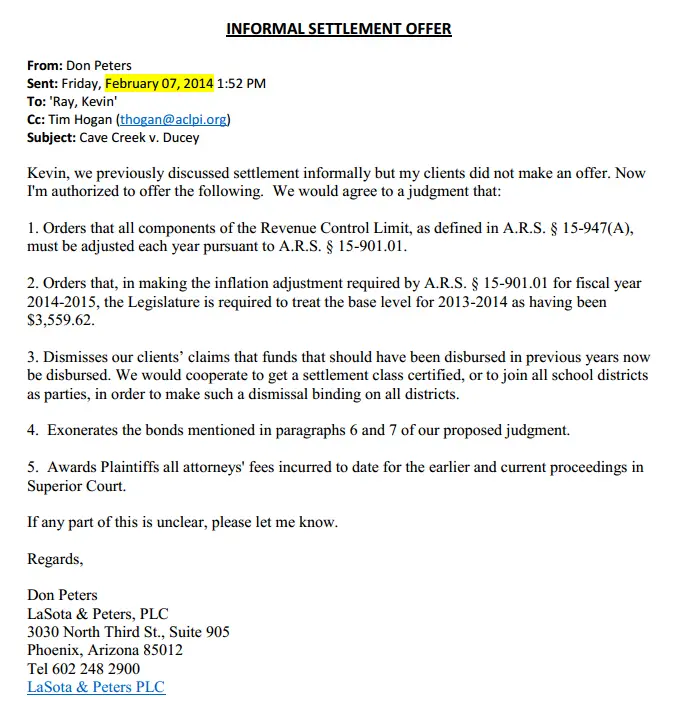
Hook asked Ducey why he wouldn’t accept a settlement offer from the plaintiffs that would eliminate back payments if the per pupil base funding level was reset.
“In the private sector, I’d be able to spend that money where it is most effective,” Ducey said. “I’m open minded to settlement. I’d much rather pay teachers than pay lawyers, but I want to make sure these dollars are going to go to the teachers in the classroom to support them with resources and proper technology.”
The money will go to the classroom, and “it would make a huge difference,” DuVal said
“We have cut education in Arizona deeper than any state in the United States,” DuVal said. “We started at a low baseline and we subtracted another thousand dollars per student over the last five years. We have put these schools into the largest class sizes in the United States.”
“No more delays, no more appeals, I believe that it is a responsible offer,” DuVal said. “We should accept it and get along with the business of investing in our schools.”
Agua Fria Union High School District Governing Board Member Maxine Hill said she wants “to see some funding going straight to those individuals who are managing our classrooms.”
Early childhood education and kindergarten
Mildred Manuel, vice chair of the First Things First Tohono O’odham Nation Regional Partnership Council, said she wanted to know where the candidates stand on early childhood education.
“How do they plan to support early childhood education? Do they believe in the importance of universal preschool?” Manuel asked.
DuVal said he favors investment in early education.
“Those nations and states that are investing in early childhood education are going to get a phenomenal rate of investment on those young minds,” DuVal said. “We now know that those young students getting early childhood education will pass the third grade reading test in higher numbers, that they will achieve more in life so early childhood education is a very important strategic investment.”
DuVal said he hoped schools would use the money received from the inflation funding settlement to fund early childhood education programs and full-day kindergarten.
“I think that all-day kindergarten is a good idea. We have it in many places. I will leave it to a local control issue,” Ducey said.
Ducey said he wanted to focus on “literacy in third grade and work backwards.”
“Early childhood literacy will make the biggest possible difference in our K-12 education system,” Ducey said. “This is what’s happening in schools that work, not only in this state but across the country.”
Grading Arizona’s schools
When asked what grade he would give Arizona’s schools, Ducey said a C-, noting that Arizona’s graduation rate of 77 percent was lower than the national rate of 81 percent.
“We have places in this state where we demonstrate that we can educate a child better than anyone else in the country, but we have far too many places that aren’t working where children are falling through the cracks and for that reason I give us a C-,” Ducey said.
DuVal said the real challenge is that Arizona schools are “all over the map” – with A schools and D schools – and all schools need to be resourced to improve student achievement.
“We have accepted a system that is allowing a differentiation of opportunity for our children’s schools,” DuVal said. “We have some of the best neighborhood schools and some of the best charters. Frankly, we have disappointments in both categories and that is the core issue.”
Recent Chamber of Commerce report
Hook asked the candidates about a recent U.S. Chamber of Commerce report that gives Arizona schools Ds for academic achievement, achievement for low-income minority students, workforce readiness and a B for return on investment.
“Those Ds need to be the focus of the governor and of our politics this year,” DuVal said. “We have cut spending and our investment in education so severely the cuts have had huge, devastating impacts on K-12 education.”
DuVal noted that 500 classrooms in the state have no permanent teacher and that teachers, who “haven’t had pay raises for years, they’re going into their own wallet for school supplies” for their classrooms.
“Superintendents are closing music and art to try to keep open a pre-K program, making draconian choices that are denying our children opportunity and this has resulted in an uneven platform for our children,” DuVal said.
Ducey noted the report gave Arizona an A on school choice.
“We have three of the top 10 schools in the country. No other state has this many, no other state has this bragging right. These are public schools,” Ducey said. “So what are we doing in these public schools that are excelling, that are as good or better than any other place in the country? That is what a Ducey administration will be about.”
Taxes
With 43 percent of the state budget already going toward K-12 education, Hook asked the candidates if they would raise taxes to improve education.
“I’m not going to raise taxes and I’m going to come at the budget like a businessman – line by line and dollar by dollar. There are places where you can have efficiencies,” Ducey said.
Ducey said he would look at streamlining the 80 plus agencies that report directly to the governor and consider using attrition to cut payroll costs as 27 percent of the state’s workforce outside education becomes eligible for retirement in the next four years.
“Two principles will drive my governorship. One, no new taxes and two, no more cuts from our public schools. Everything else can be on the table,” DuVal said. “We’re going to have to have a tough conversation about choices.”
DuVal said settling the inflation funding lawsuit would be one of his goals for his first year in office, and reforming state government, streamlining procurement and reducing healthcare spending with wellness models would be goals in years two and three.
Link to Fox 10 News video: Candidates for Arizona Governor debate K-12 education






